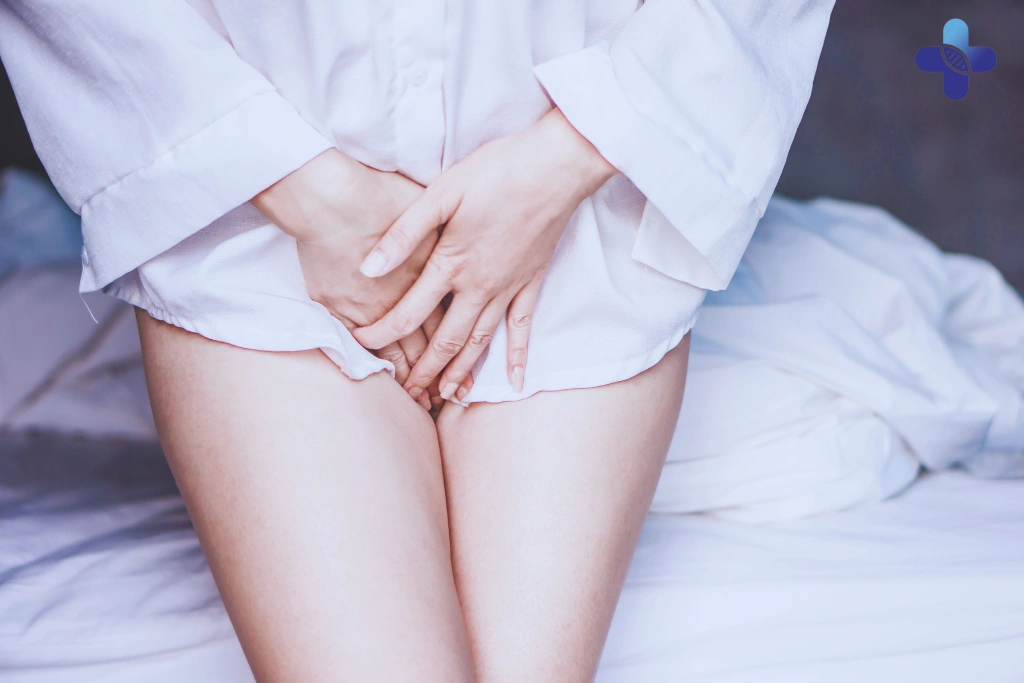If you’re experiencing persistent genital itching while in Bali, it might be more than just a minor irritation. This discomfort can stem from a variety of causes, including common skin irritations, infections, or even sexually transmitted diseases (STDs). In Bali’s tropical climate, where humidity and hygiene challenges can increase the risk of infections, understanding the underlying cause is crucial. Early detection and testing are key to addressing any potential health concerns and ensuring your comfort during your stay. Read on to learn more about the possible causes of genital discomfort and when it’s time to seek professional medical advice.

What That Itching Means: Understanding Genital Discomfort in Bali
Experiencing genital itching or discomfort can be unsettling, especially when you’re in a new environment like Bali. The tropical climate, along with activities such as swimming in pools or wearing tight clothing, can contribute to skin irritations and discomfort in sensitive areas. However, it’s important to understand that persistent itching may be a symptom of something more serious, such as a fungal infection, an allergic reaction, or even a sexually transmitted disease (STD). Recognizing the signs early and seeking professional medical help can prevent the discomfort from worsening and potentially lead to a quicker recovery.
In Bali, where hygiene practices and access to clean water can vary, maintaining proper genital care is crucial to avoid irritation or infection. While some cases of genital discomfort may be caused by common factors like poor hygiene or fungal infections, others may point to underlying health concerns such as herpes or trichomoniasis. If you’ve recently had unprotected sexual contact or notice other symptoms like abnormal discharge or sores, it’s important to get tested. Understanding the difference between benign irritations and more serious conditions is key to managing your health in Bali, and seeking medical guidance is always the best course of action.
Common Causes of Genital Itching
Genital itching can arise from several different sources, ranging from mild irritations to more serious health concerns. It’s crucial to recognize the cause of the discomfort to determine if it’s something that can be managed at home or if professional medical intervention is needed. Here are some of the most common causes of genital itching:
Fungal Infections
One of the most common causes of genital itching is fungal infections, such as yeast infections. These infections occur when there is an overgrowth of the naturally occurring yeast (Candida) in the body, typically caused by an imbalance in the genital area. Factors such as a hot, humid climate, wearing tight-fitting clothing, or taking antibiotics can promote yeast overgrowth. Yeast infections often result in intense itching, redness, swelling, and irritation, especially around the vulva or penis. A thick, white discharge that resembles cottage cheese is another common symptom of yeast infections, but it can be confused with other infections. Treating fungal infections usually involves antifungal creams or oral medication, and they can often be diagnosed and treated by a doctor in a matter of days. It’s important to see a healthcare provider for a proper diagnosis and treatment.
Harsh Soaps or Tight Clothing
Sometimes, genital discomfort can be caused by everyday items, such as harsh soaps or tight clothing. Many scented soaps, bubble baths, or douches contain chemicals and fragrances that can disrupt the natural pH balance of the genital area, leading to irritation and dryness. Tight clothing, especially underwear made of synthetic fabrics, can also cause friction and trap sweat, creating an environment that may irritate the skin. This can lead to itching, burning, or even rashes. To prevent irritation, it’s best to use unscented, gentle products for personal hygiene and choose loose, breathable cotton clothing. If discomfort continues after switching to more natural products, it may be a sign of another underlying issue such as an allergy or infection.
Allergic Reactions
An allergic reaction to various products can also cause genital itching. Common allergens include scented body lotions, detergents, latex condoms, and even the materials in certain fabrics. When the skin comes into contact with a substance it’s allergic to, it may cause symptoms like itching, redness, swelling, and sometimes blistering or rashes. For example, latex in condoms can cause contact dermatitis in sensitive individuals. If you’ve recently introduced a new product into your routine, it could be the cause of the irritation. To treat an allergic reaction, try eliminating the product or substance from your routine and using hypoallergenic products. If symptoms persist or worsen, it’s advisable to consult with a healthcare provider to identify the exact allergen and get appropriate treatment.
Sexually Transmitted Diseases (STDs)
Sexually transmitted diseases (STDs) are another common cause of genital itching. Infections like herpes, trichomoniasis, and gonorrhea can cause intense itching, along with other symptoms such as painful sores, blisters, rashes, and abnormal discharge. Itching is often the first symptom of many STDs, but it can be easily confused with other causes of genital discomfort. For example, herpes typically causes painful sores around the genital area, and trichomoniasis may cause itching along with a frothy discharge. If you have had unprotected sexual contact or experience any symptoms related to STDs, it’s important to seek medical testing. Early detection and treatment are crucial to prevent the infection from spreading and causing more serious complications.
Understanding these common causes of genital itching can help you determine if your discomfort is a result of something manageable, like irritation from hygiene products, or if it requires more serious medical attention. When in doubt, it’s always best to consult with a healthcare provider for a professional diagnosis. If you suspect an STD in bali or have persistent symptoms, getting tested is the best way to ensure you receive the appropriate treatment and maintain your sexual health.

When to Suspect an STD
If you’re experiencing genital itching, it’s essential to pay attention to other accompanying symptoms, as they could indicate an STD. Below are some of the key signs that could signal an underlying sexually transmitted infection:
Itching Accompanied by Sores or Rashes
When genital itching is followed by the appearance of sores, blisters, or unusual rashes, it is often a sign of a sexually transmitted infection, such as herpes. The herpes simplex virus (HSV) is a common cause of painful sores or blisters around the genital area, and the itching is usually more intense when the sores begin to form. These sores can rupture and cause discomfort, along with other flu-like symptoms. It’s crucial to seek medical attention if you experience these symptoms, as early treatment can help reduce outbreaks and prevent the infection from spreading to others.
In addition to herpes, other STDs like syphilis or human papillomavirus (HPV) can cause similar symptoms, such as rashes or warts. Even if the sores don’t appear to be severe, a medical consultation and testing are necessary to determine the exact cause and receive the appropriate treatment.
Abnormal Discharge
Abnormal genital discharge is one of the most common signs of an STD and should not be ignored. Discharge that is green, yellow, frothy, or has a strong odor can indicate infections like gonorrhea, trichomoniasis, or chlamydia. These infections are often accompanied by itching, discomfort while urinating, and a noticeable change in the consistency or color of the discharge. For men, discharge from the penis is common, while women may experience vaginal discharge with irritation or discomfort.
If you notice any abnormal discharge following unprotected sex in bali, it’s important to seek medical attention right away. Getting tested can help identify the infection and allow for prompt treatment to prevent further complications.
Different Symptoms in Men and Women
While both men and women can experience genital itching as a symptom of an STD, the types of symptoms and their severity can differ based on gender. Women may experience vaginal irritation, pain during intercourse, or abnormal vaginal discharge when dealing with STDs like trichomoniasis or chlamydia. In some cases, women may also develop pelvic inflammatory disease (PID) if an STD is left untreated, which can lead to chronic pain or infertility.
For men, genital itching may be accompanied by swelling, painful urination, or discharge from the penis. In some cases, men may also experience pain or swelling in the testicles or penile sores that are linked to herpes or syphilis. Understanding the gender-specific symptoms is crucial for identifying the cause of discomfort and seeking the appropriate medical care. Whether male or female, if you experience any of these symptoms, especially after unprotected sexual activity, it’s important to get tested for STDs.
Medical Conditions Often Confused with STDs
While genital discomfort is commonly linked to sexually transmitted diseases (STDs), there are several other non-STD conditions that can cause similar symptoms, such as itching, irritation, and inflammation. Understanding these conditions is important to avoid unnecessary anxiety and ensure the right treatment. Below are some medical conditions that are often confused with STDs:
Dermatitis or Eczema
Dermatitis or eczema is a skin condition that can lead to itching, redness, and inflammation, particularly in sensitive areas like the genitals. It occurs when the skin becomes irritated by various triggers, such as allergens, harsh soaps, or extreme temperatures. While the symptoms may resemble those of an STD, dermatitis is not caused by a bacterial or viral infection. The itching and redness typically occur alongside dry patches or rashes. It is important to differentiate between eczema and infections like herpes or yeast infections, as the treatments for these conditions vary. A healthcare provider can help diagnose dermatitis and provide the proper treatment, often with topical creams or moisturizers to alleviate symptoms.
Non-STD Bacterial Infections
Certain bacterial infections, like bacterial vaginosis (BV), can also cause symptoms similar to those of an STD. BV occurs when there is an imbalance in the natural bacteria of the genital area, leading to symptoms such as itching, unusual discharge, and a fishy odor. Unlike STDs, bacterial vaginosis is not typically transmitted through sexual activity. However, sexual activity can sometimes trigger or worsen the condition. It is important to recognize that BV requires antibiotic treatment, which differs from the medications used to treat STDs. Chronic BV can lead to further complications, such as pelvic inflammatory disease (PID), if left untreated, so seeking medical attention is essential.
Vulvovaginitis or Balanitis (Non-Infectious Inflammation)
Vulvovaginitis in women and balanitis in men refer to inflammation of the genital area that is not caused by a sexually transmitted infection. These conditions can cause itching, burning, and redness but are usually due to irritation, allergies, or poor hygiene. Vulvovaginitis is particularly common in women, especially after using scented hygiene products, tight clothing, or during hormonal changes such as pregnancy or menopause. Similarly, balanitis occurs in men, typically due to irritation from soaps, poor hygiene, or yeast infections. While vulvovaginitis and balanitis can mimic the symptoms of an STD, they are typically non-contagious and can be treated with anti-inflammatory creams, proper hygiene, and lifestyle adjustments.
Importance of Getting Tested
Getting tested for genital discomfort is crucial for ensuring an accurate diagnosis and receiving the appropriate treatment. Genital itching and irritation are symptoms that could stem from various causes, including both non-STD-related conditions and STDs. While it can be tempting to dismiss these symptoms or self-diagnose, seeking professional testing ensures that any underlying infection, particularly an STD, is detected early. Early detection plays a key role in preventing long-term complications, as many STDs, such as chlamydia, gonorrhea, or syphilis, may not present noticeable symptoms in the early stages, making them easy to overlook or dismiss as a mild irritation.
Testing for STDs is important not only for treating your own health but also for preventing the spread of infections to others. Some STDs, such as herpes, HIV, or gonorrhea, are contagious even if you don’t show obvious signs or symptoms. Without proper testing and diagnosis, you might unknowingly pass these infections on to others. Regular testing, especially after unprotected sexual activity or when experiencing symptoms like genital itching, discharge, or sores, helps you stay proactive in safeguarding both your own health and the health of your partners. Many confidential STD tests are available, including quick tests for HIV or gonorrhea, ensuring your privacy and peace of mind.
Finally, getting tested can offer relief and a clear path to treatment. While the uncertainty of not knowing the cause of your symptoms can be stressful, a professional test removes this ambiguity. Once an infection is identified, it can be treated promptly with the correct medication, reducing the risk of further complications. For instance, treating gonorrhea with antibiotics can prevent long-term health issues like infertility, while early HIV detection allows for the start of antiretroviral therapy to manage the virus and improve quality of life. Whether through a HIV Rapid Test or more comprehensive screening packages, testing is the first step toward restoring your health and well-being.

Where to Get Confidential STD Help in Bali
If you are experiencing symptoms of genital discomfort or suspect that you may have contracted an STD, it is essential to seek professional help from a trusted healthcare provider. Life Everyouth Bali offers a range of confidential services to ensure your health and privacy are protected throughout the testing and treatment process. Below are the key benefits of seeking help at Life Everyouth Clinic:
Discreet Consultations and Testing
At Life Everyouth Clinic, we understand that seeking help for sensitive health concerns can be uncomfortable. That’s why we offer discreet consultations, where our healthcare professionals ensure a non-judgmental and private environment. Whether you’re seeking advice or needing a thorough examination, our team of specialists will guide you through the process with respect and professionalism. We also provide a range of testing options for various STDs, including HIV, gonorrhea, syphilis, and chlamydia, to ensure that you receive the right diagnosis and treatment plan.
Privacy-Guaranteed Services
We prioritize your confidentiality at every step of the process. All testing, results, and consultations are kept strictly confidential to ensure your peace of mind. We take great care in handling your personal information, following the highest standards of privacy and security. Whether you choose to visit the clinic in person or opt for a home visit, rest assured that your privacy is our top priority. Our clinic is fully equipped to provide a comfortable, safe, and private space for all patients.
Home Visit Options Available
For those who may feel more comfortable at home or are unable to visit the clinic, Life Everyouth Clinic offers home visit options. Our healthcare professionals can come to your location for consultations and testing, providing the same level of care and confidentiality you would receive at the clinic. This service is particularly convenient for those with busy schedules, mobility challenges, or anyone who prefers the convenience of receiving medical attention in the comfort of their own home. Scheduling a home visit is easy and ensures that you still receive the professional care you need without compromising privacy.
Booking Your Appointment
Booking an appointment at Life Everyouth Clinic is quick and easy. You can schedule an appointment online or contact our clinic directly to arrange a time that suits your schedule. Whether you’re seeking routine STD testing in bali or have concerns about specific symptoms, our team is ready to assist you every step of the way. With our discreet services, privacy guarantees, and home visit options, we ensure that your experience with us is as comfortable and confidential as possible.

Conclusion Genital Itching in Bali? What You Need to Know About Discomfort & STDs
If you are experiencing persistent genital itching or discomfort while in Bali, it’s important to recognize that this may be more than just a minor irritation. The tropical environment, along with lifestyle factors such as humidity, tight clothing, and unprotected sexual activity, can increase the risk of infections, including sexually transmitted diseases (STDs). Early detection is key to addressing these potential health concerns and avoiding complications. By understanding the different causes of genital discomfort and seeking professional medical advice when needed, you can ensure a more comfortable stay in Bali while protecting your overall health.
Life Everyouth Clinic in Bali provides confidential, professional testing and treatment options to help diagnose the underlying causes of genital discomfort, including common infections and STDs. Whether you opt for a Basic STD Test Package or a more comprehensive check-up, Life Everyouth Clinic ensures your privacy and comfort at every stage. The clinic offers a variety of packages to suit your needs, such as the Medium STD Test Package and Premium STD Test Package, along with home visit options for added convenience. Don’t delay getting tested—early diagnosis and treatment are essential to prevent further complications and ensure your health is in good hands.
Frequently Asked Question Genital Itching in Bali? What You Need to Know About Discomfort & STDs
What causes genital itching in Bali?
Genital itching in Bali can occur due to various factors, including the tropical climate, which can cause excessive sweating and irritation. It could also be a result of poor hygiene practices or the use of irritating soaps and hygiene products. However, STDs like herpes, trichomoniasis, and yeast infections are also common causes of genital itching in Bali, so it’s important to get tested to determine the exact cause and receive the appropriate treatment.
Is itching always a sign of STD?
Not necessarily. Genital itching can be caused by a range of factors, such as skin irritations, fungal infections, or allergic reactions. However, if itching follows unprotected sexual activity, it could be a sign of an STD, and it is crucial not to ignore it. It’s always better to get tested to rule out an infection and receive prompt treatment if needed.
How long should I wait before seeing a doctor?
If genital itching persists for more than a few days or worsens, it’s best to consult a doctor right away. Early medical intervention can prevent complications, especially if the itching is caused by an STD. Delaying a visit to a healthcare provider may lead to further discomfort or long-term health issues.
Can I use over-the-counter creams for genital itching?
Over-the-counter creams or ointments may provide temporary relief for minor itching caused by irritation or dryness. However, they do not address the underlying causes, such as STDs. If the itching continues or is accompanied by other symptoms, it’s important to consult a doctor to ensure proper treatment.
What STD causes intense itching?
Herpes and trichomoniasis are common STDs that cause genital itching. Herpes typically causes painful blisters or sores that can rupture, leading to itching and irritation. Trichomoniasis, caused by a parasite, can also result in intense itching, often accompanied by abnormal discharge. Getting tested is essential for an accurate diagnosis.
Can poor hygiene cause similar symptoms?
Yes, poor hygiene, especially in Bali’s humid climate, can lead to itching and irritation in the genital area. Sweating and friction from tight clothing can exacerbate discomfort and lead to skin rashes or fungal infections. It’s important to practice good hygiene and wear breathable clothing, but if symptoms persist, a medical check-up is advised to rule out infections or STDs.
Is genital itching common after swimming?
Swimming in chlorinated pools or ocean water can sometimes cause irritation to the sensitive genital skin, leading to itching. The chemicals in pool water or saltwater can dry out the skin, which may result in temporary discomfort. However, if the itching persists or is accompanied by other symptoms like a rash or discharge, it might indicate an infection, and testing is recommended.
Can STDs cause itching without visible sores?
Yes, some STDs like chlamydia and gonorrhea can cause itching or discomfort in the genital area without visible sores or blisters. These STDs may lead to symptoms like painful urination, abnormal discharge, or general irritation. Regular testing is essential because many STDs are asymptomatic and can be transmitted without visible signs.
Where can I test for genital discomfort in Bali?
You can visit Life Everyouth Clinic for discreet consultations and testing for genital discomfort and STDs. The clinic offers private, comfortable appointments with professional staff, ensuring your privacy throughout the process. Additionally, home visit options are available for those who prefer testing in the comfort of their own homes.
Is genital itching contagious?
If genital itching is caused by an STD, then yes, it can be contagious. Infections such as herpes and trichomoniasis can spread through sexual contact, even when there are no visible sores or symptoms. It’s essential to get diagnosed and treated, and it is recommended to avoid sexual contact until cleared by a healthcare provider.
What is the cost of STD testing in Bali?
The cost of STD testing in Bali can vary depending on the type of test and the clinic you choose. At Life Everyouth Clinic, prices for STD tests start from IDR 800,000 for a basic test package, with more comprehensive packages, including testing for multiple infections like HIV, gonorrhea, and syphilis, ranging up to IDR 4,688,000. For an accurate estimate, it’s best to contact the clinic directly to inquire about the available packages and pricing based on your specific needs.
